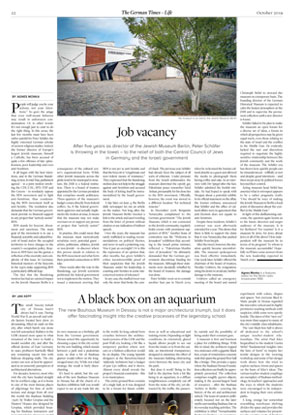After five years as director of the Jewish Museum Berlin, Peter Schäfer is throwing in the towel

People will judge you by your actions, not your intentions.” So goes the adage that even well-meant behavior may result in unforeseen condemnation. Or, in other words: It’s not enough just to want to do the right thing. In this sense, the last few months must have been rather painful for Peter Schäfer, the highly esteemed German scholar of ancient religious studies. Indeed, the former director of Europe’s largest Jewish museum, himself a Catholic, has been accused of quite a few offenses of late: spinelessness, poor leadership and even anti-Semitism.
It all began with the best intentions, and in the German Bundestag, no less. In mid-May, parliament agreed – in a joint motion involving the CDU/CSU, SPD, FDP and the Greens – to resolutely oppose the BDS movement and to fight anti-Semitism, thus condemning the BDS movement itself as anti-Semitic. The resolution also demands that the German government provide no financial support to any project that “actively assists” BDS.
BDS stands for boycott, divestment and sanctions. The main goal of the movement is to use a financial, scientific and cultural boycott of Israel and/or the occupied territories to force changes to the country’s occupation policy. Reactions to BDS have run the gamut, a reflection of the enormity and complexity of this issue. In Germany, historical memory of the boycotts in the 1930s make supporting BDS a particularly difficult leap.
The fact that the Bundestag motion has had an outsized impact on the Jewish Museum Berlin is a consequence of the cultural center’s organizational form. While other Jewish museums across the globe tend to be municipal in structure, the JMB is a federal institution. There is a board of trustees appointed by the German president that comprises mostly politicians. Three-quarters of the museum’s budget comes directly from federal coffers. So, if the federal government approves and actually implements the motion at issue, it means that the museum may not make overtures to or support any person or project that “actively assists” BDS.
In practice, this could mean that the museum must meticulously scrutinize every potential guest – artists, politicians, athletes, Jewish or non-Jewish – to discover where this person stands in relation to the BDS movement and what form their potential connections to BDS take.
Three weeks after the vote in the Bundestag, 240 Jewish scientists petitioned the federal government not to implement the motion. They issued a statement averring that BDS is not per se anti-Semitic and that the boycott is “a legitimate and non-violent means of resistance.” They expressed that the Bundestag motion does not help in the struggle against anti-Semitism and accused the body of letting itself be instrumentalized by the Israeli government.
A day later, on June 4, the Berlin daily newspaper taz ran an article on the matter. Not long after, the Jewish Museum Berlin tweeted a link to the article and used wording from the letter of protest without citation or any indication of indirect speech.
Over the years, the museum has rarely trafficked in reading recommendations on political themes, and never in such a polarizing way. Was it just an oversight? Or is this the expression of an opinion that, after months, has given Schäfer’s critics incontrovertible proof of their suspicions that the Jewish Museum, under his leadership, is courting anti-Semites in some misconceived notion of tolerance?
In any case, the muffed tweet was only the straw that broke the camel’s back. The previous year, Schäfer had already been the subject of all sorts of criticism. Under pressure from the Israeli ambassador, the museum disinvited the openly gay Palestinian peace researcher Sa’ed Atshan, presumably for his close ties to the BDS movement. Officially, however, the event was moved to a different location “for technical reasons.”
In December 2018, Benjamin Netanyahu complained to the German government: “The Jewish Museum, which is not connected to the Jewish community, regularly holds events with prominent supporters of BDS.” Another bone of contention was the “Welcome to Jerusalem” exhibition that, according to the Israeli prime minister, reflected a “Palestinian-Muslim view of Jerusalem.” He ultimately demanded that the German government discontinue funding for the museum. Although these statements were decidedly rebuffed by the board of trustees, the damage was done.
Peter Schäfer went on to commit another faux pas in March 2019, when he welcomed the Iranian cultural attache as a guest and allowed the media to photograph them having coffee and cake. In an interview with Der Spiegel after the fact, Schäfer admitted the foolish mistake. He had hoped to speak with Moujani about a potential exhibit. In its official statement on the affair, the Iranian embassy, announced that Schäfer and the office of cultural affairs were in agreement that anti-Zionism does not equate to anti-Semitism.
Despite these incidents, Schäfer’s contract was soon afterwards extended for a year. This shows that there is little to support the claim that it was Netanyahu that pushed Schäfer from his job.
After the tweet, however, the situation quickly became uncomfortable. The museum spokesperson was fired, effective immediately. One week later, Schäfer offered the chairman of the board of trustees, Monika Grütters, his resignation, citing his desire to avoid any further damage to the museum.
Grütters called an emergency meeting of the board and named Christoph Stölzl to steward the museum on a temporary basis. The founding director of the German Historical Museum is expected to calm the heated atmosphere at the JMB and to supervise the permanent collection until a new director is found.
Schäfer failed in his plan to make the museum an open forum for a diverse set of ideas, a forum in which all perspectives may be given equal merit, even those relating to the state of Israel and the conflict in the Middle East. He evidently lacked the tact and discretion required to negotiate the highly sensitive relationship between the Jewish community and the work of the museum. The Schäfer era has shown how quickly people can be misunderstood – willfully or not and despite good intentions – and then swept away by political forces beyond their control.
Acting museum head Stölzl has asserted what in retrospect appears to be a rather pragmatic truth: “One should be wary of making the Jewish Museum in Berlin a focal point of discussion about the conflict in the Middle East.”
In light of this disillusioning outcome, the question again looms as to the future direction and target audience of the museum. Is it for Berliners? For tourists? Is it a museum by Jews, for Jews, about Jews or all of the above? How independent will the museum be in terms of its program? To whom is the museum accountable? Hopefully we’ll have some answers from the new leadership expected in March 2020.
Agnes Monka
works for the Berlin-based public broadcaster rbb and as a freelance journalist.




